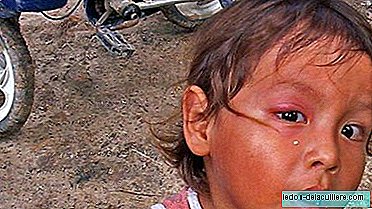
A recurring theme that is always current are the possible nutritional deficits in children. Although it is true that in developed countries it is very difficult for them to occurIt is also true that it is necessary for the child to receive a varied diet to fulfill this premise.
The problem is that sometimes it is difficult to make a varied diet in a child, especially the youngest ones, who can refuse many of the foods offered. This is a transitory stage but sometimes it can become a serious problem if you do not have enough time and patience to save that child's rejection of certain foods.
The best way to reduce this risk is to Always check the child's diet with the pediatrician and "play" with the preparation of the dishes, so that the professional can certify the sufficient variety and nutritional quality of the food and the child associate eating with something fun. Even so, it is very common for many parents to have doubts about possible deficits in this age range, one of the most consulted being that of a possible vitamin deficit.
In other areas, the problem is that access to foods containing these vitamins is limited or difficult.
The call "vitamin B" really is not a single compound, but a group of substances of which the most important in case of deficit are thiamine, riboflavin, niacin, B6, folate, B12, biotin and pantothenic acid.
This post discusses the main aspects related to the deficit of this group of substances, such as causes, symptoms and treatment.
Why vitamin B deficiency occurs
Since vitamin B is not a single one but is a group of substances, in general the common denominator for all of them is that for a vitamin B deficit (or B vitamins) it is necessary for the child to eat a diet with Little variety and diversity of food.
Depending on which group compound is involved, it will be found more easily in certain foods. In general and by way of summary, dairy, meat, cereals and vegetables are usually rich in the different compounds that make up the group of vitamins B.
In areas where it is more difficult to access these foods it is much easier to see alterations secondary to the deficit of some of the components of the group of vitamins B.
Sometimes the problem is that the child has another associated pathology that causes problems in the digestion or absorption of certain nutrients, which can also trigger deficits of some of the compounds included in the group of Vitamins B.
Some deficits can also be seen in strict vegetarians, although this is logically something very rare in childhood.
Symptoms of vitamin B deficiency
The symptoms also depend on the substance in particular that is deficient, although usually most produce symptoms and symptoms at the level of the nervous system. Among the most frequent symptoms at this level are itching, discomfort, pain and even paralysis. Sometimes what is evidenced are changes of character in the child. You can also see pictures of vision impairment or even brain damage, in the most severe cases.
You can also see skin symptoms, such as different varieties of dermatitis, or involvement of other organs such as the heart.
The symptoms depend not only on the compound that is deficient (for example, the thiamine deficit is the cause of beriberi), but the severity of the symptoms depends on the importance of the deficit. Hence the importance of properly monitoring the healthy child and providing a complete and varied diet.
Vitamin B deficit treatment
Treatment of vitamin B deficiency (or B vitamins) it depends on the compound that is objectified as deficit and the severity of the symptoms that the child presents.
In developed countries it is very difficult to see a deficit of B vitamins, and much more a serious deficit. In these cases, the child may require studies to estimate other processes (such as altering the absorption of vitamins) or be admitted to treat symptoms.
In mild deficits the pediatrician will study the degree of deficit and will schedule the appropriate medication, the pattern of which must always be met.












